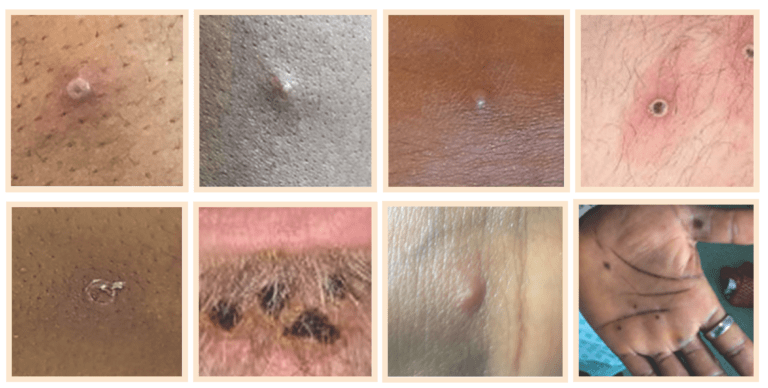What is Monkeypox?
- monkeypox is a viral disease, and there are 2 distinct strains of monkeypox virus: Central African strain, and West African strain.
- The source of monkeypox is unknown.
What are the Symptoms?
- monkeypox symptoms are similar to smallpox symptoms, but milder, rarely fatal.
- Many patients are asymptomatic.
- Illness begins with fever, headache, muscle aches, backache, swollen lymph nodes, and a general feeling of exhaustion and discomfort.
- Within 1-3 days after fever, patient will develops a papulo/vesicular rash; (raised fluid filled bumps).
- This rash can appear first on face, then usually appears on genitals and perianal areas.
- Illness typically lasts 2-4 weeks.

How is monkeypox spread?
- Monkeypox virus is spread by person to person through direct contact with infectious rash, scabs, or body fluids, also respiratory if person has face to face contact, kissing, cuddling or sex. Pregnant persons can spread virus through the placenta.
- Many affected in current global outbreaks are gay, bisexual, or other men who have sex with men. This will likely change over time, and the rash location can change as well.
- Touching linens or clothing is another way the virus is spread.
- Incubation period is 12 days with a range of 7-17 days.
What is the Treatment for monkeypox?
- Persons should be evaluated by a healthcare provider, to determine if symptoms are monkeypox and require testing.
- Most patients have mild illness and require no treatment. The treatment when needed, is an antiviral called Tecovirimat.
- There are 2 vaccines against monkeypox, called ACAM2000 and JYNNEOS. These are used to prevent monkeypox post exposure and can be done up to 14 days after exposure.
- People who may be eligible for vaccine include: someone who has been identified as a contact to someone who is positive, anyone who has been exposed.
- Who is eligible and how to get it can contact 1-877-PA-HEALTH or their local health department.
- If you have been exposed to monkeypox, monitor your health and check temperature twice daily. If symptoms develop, immediately self-isolate and contact your provider or health department.
- If you are asymptomatic, can continue your daily routine.
- Contacts should not donate blood, cells, tissue, breastmilk, semen or organs while under surveillance.
Other Questions
- Has monkeypox been found in the San Luis Valley?
- Yes, as of October 18, 2022, 2 monkeypox cases have been reported in the SLV. The SLV Healthcare Coalition has formed a task force to ensure that local providers are well prepared and that monkeypox response is well coordinated in our region.
- Has monkeypox been found in the Arkansas Valley (La Junta/Rocky Ford/Ordway/Las Animas)?
- Not at this time.
- Has monkeypox been found in the Upper Arkansas Valley (Buena Vista/Cañon City)?
- Not at this time.
The SLV Healthcare Coalition’s MPX task force is working with local healthcare systems to identify where testing will be available in the San Luis Valley region. We will update on our Arkansas Valley and Upper Arkansas Valley regions as information becomes available.
For more information on monkeypox: https://www.cdc.gov/poxvirus/monkeypox/ or https://cdc.gov/poxvirus/monkeypox/faq.html
Regional Public Health Agencies and Contact Information
SLV
- Alamosa County Public Health: 719-589-4848, M-F 8:00 am to 4:30 pm
- Conejos County Public Health: 719-274-4307, M-Th 7:00 am to 5:30 pm
- Costilla County Public Health: 719-672-3332, M-Th 7:00 am to 5:30 pm
- Mineral County Public Health: 719-658-2416, M-F 8:00 am to 4:00 pm
- Rio Grande County Public Health: 719-657-3352, M-F 8:00 am to 4:00 pm
- Saguache County Public Health: 719-655-2533, M-F 8:00 am to 4:00 pm

